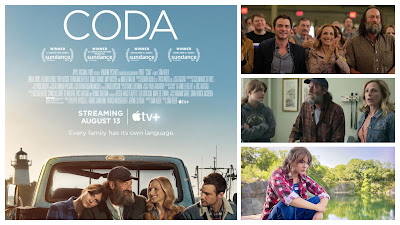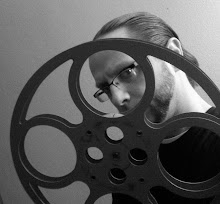As previewed by Reel Speak last week (HERE), Sian Heder’s family drama CODA has been earning attention for being the first of its kind; the film about the only hearing member of a deaf family was released in theatres and on Apple TV with full-captions…a major step towards including the hearing-impaired into cinema. Being innovative and opening doors is important, but no matter how well that is done, the film still has to deliver.
Seventeen-year-old Ruby (Emilia Jones), is the only hearing member of her family, which includes her father Frank (Troy Kotsur), her mother Jackie (Marlee Matlin), and her brother Leo (Daniel Durant). When Ruby’s talent for singing is discovered by her choir teacher Mr. V. (Eugenio Derbez), Ruby must decide between a possible scholarship and supporting her family.
Directed by Sian Heder and a loose remake of the 2014 French film LA FAMILLE BELIER, CODA is a family drama that carries several different genres; it’s a coming-of-age tale, weaved with a high school drama, working-class problems, and of course…the struggle for the hearing-impaired to survive in today’s fast-moving and complicated world. Ruby’s family relies on her heavily; to listen and translate via sign-language for them in simple every-day dealings such as keeping their fishing boat/business afloat and in doctor’s visits. The near over-reliance the family has on her makes her decision to apply for a music scholarship at prestigious Berklee all the more difficult.
While Sian Heder is weaving many storylines at once, she manages to tell the story of the hearing impaired in funny, innovative, and emotional ways. The manipulation of sound only happens here and there, with one powerful moment in the third act that has to be seen (and not heard) to believe. The film does not rely on pity or patronizing, but instead focuses on the family and all of the love, resentment, uniting, and arguing that any family would have.
Filmed on location in Gloucester, Massachusetts, the film looks gorgeous and neatly captures the grittiness of the working fishing community. American Sign Language (ASL), makes up half the dialogue…which is witty, funny, and powerful in each scene. Music selections, most of which are sung by Ruby, are perfectly chosen for the scenes and overall situation she finds herself in.
Acting is tremendous. Emilia Jones spent nine months learning ASL and taking voice lessons and it shows; her voice is powerful and full of soul, and her ability to turn on the tears is stunning. The film benefits greatly by having actual hearing-impaired actors in the role of the family, with Troy Kotsur, Daniel Durant, and Marlee Matlin all excellent. The show is nearly stolen by Eugenio Derbez as the strict, yet nearly-flamboyant choir teacher who is a laugh a minute.
As expected with a film like this, the finale is an emotional wallop that is sure to bring the tears while being uplifting, but it is executed in a simple way that avoids any cliches. CODA is a landmark film not just for its inclusiveness of the hearing-impaired, but also for its gentle and brilliant touch that opens those doors wide for the rest of us to see through; making this the true definition of an inclusive film. From its breathtaking opening shot to its final, emotional frame…CODA delivers and transcends.
BOTTOM LINE: See it


No comments:
Post a Comment
A few rules:
1. Personal attacks not tolerated.
2. Haters welcome, if you can justify it.
3. Swearing is goddamn OK.